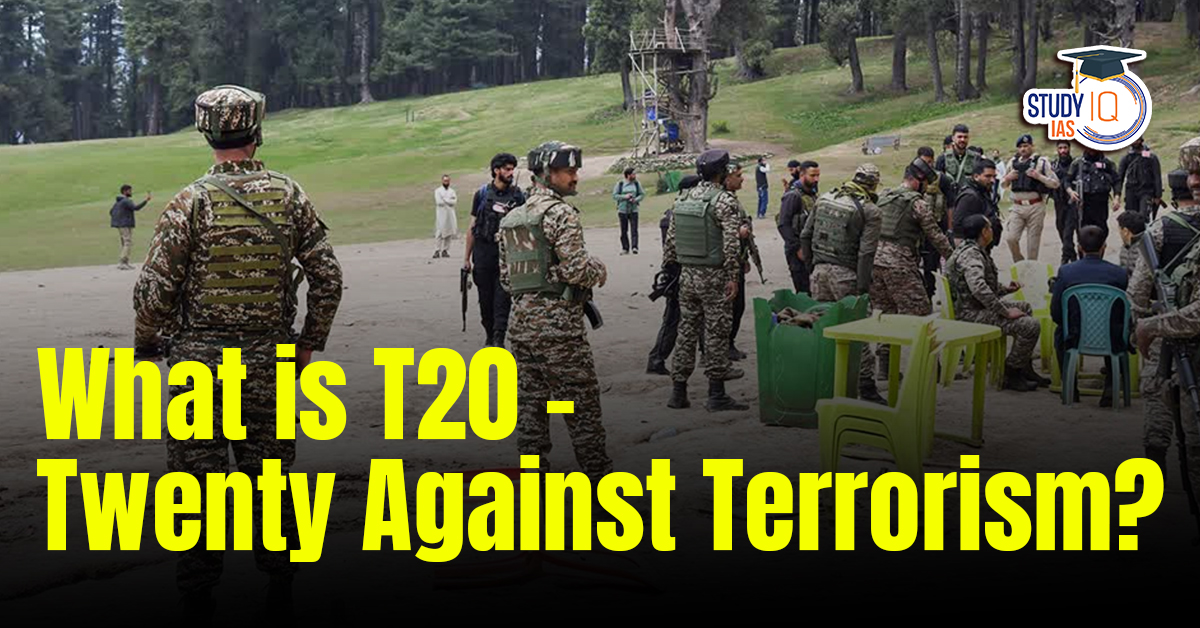Table of Contents
Context: Western-dominated counter-terrorism institutions are proving ineffective against the continuing threat of state-sponsored terrorism, particularly from Pakistani groups; therefore, India introduced a novel T20 – Twenty Against Terrorism coalition.
What is T20 – Twenty Against Terrorism?
- T20 – Twenty Against Terrorism is a proposed India-led international coalition comprising 20 countries from the Global South, designed specifically to confront terrorism comprehensively, proactively, and effectively.
- Objective:
- Address frequent, asymmetrical, and politically complex terror threats common in developing countries.
- Act as a dedicated global platform representing nations consistently impacted by terrorism.
- Potential Members: Countries facing frequent terror threats, including India, Indonesia, Nigeria, Kenya, Egypt, Mali, Fiji, Philippines, Ethiopia, Kazakhstan, Sri Lanka, and Vietnam.
Core Functions
- Intelligence sharing through joint task forces.
- Capacity building, counter-radicalisation programmes, and collaborative training.
- Joint diplomatic initiatives to name and shame terror sponsors.
- Address emerging threats: cyber-terrorism, drone warfare, crypto-financed extremism.
- Foster resilience through development-linked de-radicalisation.
How T20 is Different from Existing Groupings
| Feature | Existing Platforms (UN, FATF, GCTF) | T20 – Twenty Against Terrorism |
| Membership Composition | Dominated by major powers, largely Western-centric. | Exclusively, Global South countries are directly facing terror regularly. |
| Operational Focus | Often reactive, bureaucratic, and politically influenced. | Proactive, agile, operationally swift, tailored to regional realities. |
| Decision-Making | Influenced by geopolitical rivalries, leading to diluted actions. | Unified by shared experience, collective action, and swift consensus. |
| Security Paradigm | Western security frameworks, episodic attack response. | Continuously addressing terror as a persistent security challenge. |
| Mandate Clarity | Broad, diffuse mandates often lack actionable clarity. | Specific, clear, practical mandate: intelligence sharing, resilience-building, real-time coordination. |
| Diplomatic Approach | Tends towards diplomatic caution and neutrality. | Willing to publicly identify, condemn, and diplomatically isolate state sponsors of terrorism. |
| Response Speed | Slower response times due to procedural constraints. | Quick, coordinated responses due to streamlined, collaborative mechanisms. |
| Inclusivity & Relevance | Often excludes countries disproportionately affected by terrorism. | Prioritises inclusion, giving voice and platform to affected nations usually marginalised in global forums. |
Strategic Significance of T20 – Twenty Against Terrorism for India
- Leadership Without Military Baggage: Positions India as a global leader in counter-terrorism without military entanglements or perceived interventionism.
- Strengthens India’s Global South Credentials: Reinforces India’s image as a responsible global actor that champions the collective interests of developing nations.
- Enhances Diplomatic Clout: India gains diplomatic leverage in international security debates, influencing narratives on terrorism.
- Operational Advantages: India can leverage its extensive experience dealing with cross-border terrorism and digital capacities to effectively lead and host T20’s secretariat, training hubs, and information centres.
T20 – Twenty Against Terrorism offers a targeted and innovative approach to global counter-terrorism, significantly distinct from existing platforms. By focusing on the unique and sustained challenges faced by the Global South, it fills critical gaps in global counter-terrorism architecture, placing India at the forefront of a vital global initiative.


 Private Sector Participation in Defence ...
Private Sector Participation in Defence ...
 India–France Strategic Cooperation in ...
India–France Strategic Cooperation in ...
 Regulatory Framework for AI in Healthcar...
Regulatory Framework for AI in Healthcar...




















